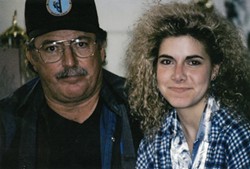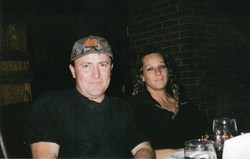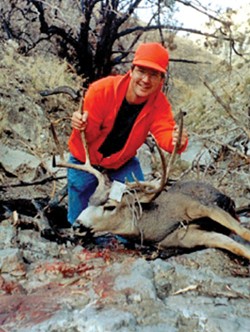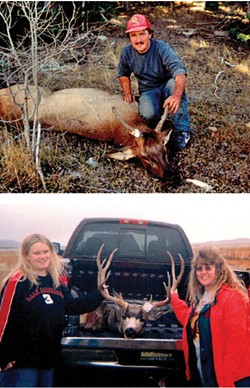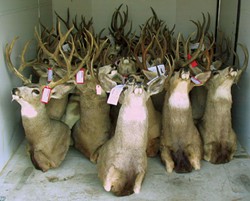Hunted
A family dispute escalated into a four-year poaching prosecution that ended in three deaths and no resolution
By Stephen Dark @stephenpdarkAs an investigator for the Utah Division of Wildlife Resources videotaped the collection of dozens of mounted mule-deer heads, antlers and other wildlife trophies on the walls of her home on Oct. 6, 2009, Angella Jensen denounced her husband, her two oldest sons and her brother-in-law as the worst poachers in Utah history.
"That particular deer came out by Dugway," she told investigator Jerry Schlappi, "'proximately five years ago."
Schlappi asked who got the deer.
"Oh, my husband, Gerald D. Jensen," she replied.
In season or out of season?
"Out of season."
She accused her family not only of illegally hunting deer as far back as the 1980s, during and after the November rut—when mating distracts the animals from eluding hunters—but also practicing what she called "hack-a-rack," essentially cutting off the antlers, lodging them in the branches of a tree, leaving the carcass to rot, and then returning for the horns months later, the weather having by then turned evidence of a fresh kill into just another set of antlers.
On Jan. 3, 2010, investigators from DWR and the Salt Lake County District Attorney's Office served search warrants at Angella's home and those of Angella's brother-in-law, Robert Jensen, and Angella and Gerald's son Jerry Jr., seizing 90 mule-deer heads and antlers.
Five months later, Robert and Gerald Jensen, Gerald's oldest two sons, and Angella—whose multiple interviews had implicated her in the poaching—were arrested and each charged with up to 20 various counts, including racketeering.
Four years later, the multiple prosecutions of poaching-related charges had been dismissed, the charges of witness tampering that had been filed during prosecution were pleaded out as diversions—"Basically a slow-motion surrender by the state," says Robert Jensen's attorney, Colleen Coebergh—and two defense attorneys and a judge had died as the case inched its way through the legal system.
Three members of the Jensen family were also dead.
Robert and Gerald's sister, Jackie, committed suicide. Her grieving father died soon after, followed by Angella.
All three were casualties, the Jensens say, of a wild goose chase that was initially driven by Angella's spite over her divorce from Gerald but soon took on an unstoppable power as the prosecution pressured family members to turn on each other, imposed no-contact orders between family members and offered plea deals that defense counsel viewed as little more than extortion.
All this was despite DA investigator Dirk Watrous telling a witness who was concerned about Angella's safety in early 2010, "These are poached deer, for god's sake, we don't want someone getting hurt over those."
Jerry Jr.'s defense attorney, Patrick Coram, calls the Jensen prosecutions "very, very unusual." He cites the "hot and heavy" pressure DWR brought early in the case and the fact that in four years of prosecution, his client never had a preliminary hearing. But most unusual, Coram says, was that the Jensens were charged under Utah's equivalent of the federal RICO statute, something usually reserved for going after "mobsters, high level drug dealers or organized prostitution, not a bunch of family members that [were] allegedly poaching,"
And the Jensens say that Vincent Meister—a veteran prosecutor at the Salt Lake County DA's Office who has himself run afoul of wildlife laws—was so determined to break the family in order to get plea deals that he hounded Jackie until she killed herself.
Robert's attorney Coebergh sums up the net result, after so much effort and expense: "Six defendants, 75 counts, over 4 years, 0 convictions."
Robert's eyes darken as he talks about how Jackie's death changed him and his family. Before her death, he says, he had contemplated taking a plea deal to avert financial disaster and prison. But when Jackie hanged herself, a line was drawn.
"I wasn't guilty," he says. "It really brings my blood pressure up that somebody can intimidate me to say I did something I didn't do. I don't care if it costs me everything. There ain't no stinking pleas coming out of this. I'd rather go to prison than be bullied by Vincent Meister."
FAMILY HISTORY
In a June 30, 2010, notarized letter to Meister, Robert and Gerald's father, Gerald Jensen Sr., noted that DWR investigator Schlappi did not believe that a hunter could possess so many trophies through legal means. "They hunt harder than most; that's how you get a trophy," he wrote, adding that his sons have "been collecting horns and sheds since they were youngsters. It was their hobby, their passion."
As the brothers grew up, they dedicated every weekend they could come the mid-October legal hunting season to camping out in the West Desert, looking for "the smart bucks with big antlers that are really hard to kill," Robert says.
The brothers also passed their passion for hunting onto their children. Gerald D. Jensen's son Jerry Jr. recalls how he claimed his first buck when he was 14. He was on top of a mountain, he says, and had just told his uncle "we're not going to see crap; then out popped a three-point. I missed two shots at him, then I calmed down, put a good shot on him and knocked him down."
In his letter to Meister, Gerald Sr. described how his sons "spent months every year watching deer in their natural habitats; then they would purchase legal licenses and go hunting as is their right."
After scouting for mature bucks, they'd usually be successful in their quest to shoot one. Then they'd notch the tag—tying the day's tag to the antler—field-dress their kill, pack out the meat and take the "cape" [the skin from the head] and antlers to a taxidermist.
Gerald D. Jensen says mounting a head "shows respect to the animal. You like to remember the deer and when you got him. It brings back all the memories, all the work it takes to get them."
THE INFORMANT
Gerald D. Jensen—known just as Jerry—met Angella when he was 16. "I found somebody I loved," Jerry says. They had three boys, split up twice acrimoniously, then got back together. "We had our problems, mainly from me drinking," Jerry says.
In late summer 2009, Angella was reunited with the son she'd been forced to give up when he was a baby, fathered by someone other than Jerry when she was a teenager. Then 28, Ryan Robinson was a convicted felon with forgery and drug-related convictions, but for Angella, the reappearance of her son after a lifetime apart was an opportunity to make amends by bringing him into her family.
"I think it tore her up her entire life she wasn't able to raise him," Angella's son Jerry Jr. says. Robinson is currently in jail awaiting trial on charges that he murdered his girlfriend in 2012.
Robinson's presence in the Jensen home and his drug habits drove a wedge between Angella and her husband and her two oldest sons. In August 2009, two of Angella's sons, Jerry's brother, Robert, and other members of their families signed affidavits condemning her violent behavior after she threw her husband out of the house.
In mid-September, one of Angella's sisters e-mailed a DWR investigator requesting immunity for Angella in exchange for information on the Jensen family. "I believe that this will be the biggest poaching case that the state of Utah has ever processed," she wrote.
On Oct. 7, 2009, Angella and Robinson went to downtown Salt Lake City to meet with prosecutor Vincent Meister.
Meister joined the DA's Office in 1987 as a law clerk, and rose through the ranks to head the gang unit before his current position as a homicide prosecutor.
One prosecutor describes him as "a gifted courtroom attorney. He's able to connect with juries. He has an everyman quality."
Some defense attorneys are less impressed, however. In several high-profile long-running homicide trials, his ethical behavior became the focus of motions and hearings as to whether he had intentionally misled the defense.
"For whatever reason, for Vince, the end justifies the means, and that's a very dangerous approach to prosecuting and enforcing the law," says Kent Hart, executive director of the Utah Association of Criminal Defense Lawyers. "Because mistakes will result, and innocent people will be affected."
Meister dismisses such criticism as based on "hearsay of hearsay."
Meister has had his own brushes with wildlife violations, in his home state Wyoming. In 2001, a game warden cited him for purchasing fishing, black bear, deer and elk licenses while claiming to be a Wyoming resident, securing a much cheaper price than an out-of-state hunter.
View the incident reportMeister pleaded no contest to 10 counts of taking wildlife on improper licenses, and paid $4,000 in restitution.
View Meister's appealThat same year, he notes, Utah DWR named him prosecutor of the year. "Kind of ironic," he says.
In Angella Jensen, DWR and the DA's Office were convinced they had found a treasure trove of information regarding generations of one family's poaching. Meister says the consistency of the detail she gave over several interviews led them to believe she was truthful.
But Angella and Jerry reconciled in late 2009, and in December, she stopped returning investigators' phone calls. In the face of Angella's silence, the state decided to accelerate its plans.
READY TO CRACK
Robert and his wife, Wendy, were in church on the first Sunday in January 2010 when he got a text from his daughter telling him, he recalls, "you better get home, Fish & Game is going to kick your door down."
DWR and the DA's Office had served search warrants on Robert and Jerry's homes and Jerry Jr.'s rented apartment.
View the affidavit for the search warrantsWhen Robert and his wife got to their South Salt Lake house, they found DWR and DA investigators surrounding their property. Among the DWR officials, to the Jensens' surprise, was DWR conservation officer Holly Riddle, someone Robert had socialized with during the time his sister, Jackie, had dated Riddle's father-in-law.
DWR seized 29 mounted heads and antlers from Robert's house, lining them up on the front lawn. At Angella and Jerry's residence, they found not only heads, but also a marijuana plant and some guns in a hidden safe.
The same day the search warrants were executed, DWR investigator Brad Probst pulled Jerry Jr. out of work at a local pet store and interviewed him in his truck. He told the 20-year-old that other family members were blaming him for some of the poaching. Jerry Jr. said his mounted heads came from "hiking my ass off and busting deer out of cedar trees and putting halfway decent shots on them."
Probst told him he knew he was nervous. "You're getting a little bit dry-mouthed, kind of thirsty, ready to crack just a little bit."
Jerry Jr. was silent, then said he'd been with his father when he was 16 on a chukkar hunt one December and his dad shot a deer.
Four years later, Jerry Jr. says he was frightened they were going to arrest him and gave them something he knew was false and that others had witnessed being legally killed.
DWR investigators had found that Angella had applied for multiple hunting permits under Jackie Jensen's name. Jackie told investigators that she had legally killed a deer and an antelope, and was so upset by it that she cried all the way home.
But investigators believed it was her brothers who had dispatched the animals, illegally using her tags. And in the fragile Jackie, they spied a weak link in her brothers' steadfast refusal to admit any wrongdoing.
Short and delicate—weighing just 93 pounds—Jackie dealt with her multiple sclerosis while singlehandedly raising her 5-year-old son. Jackie was also caring for her mother, Patricia, who had been diagnosed with Alzheimer's.
In February 2010, the DWR's Riddle went to Jackie's home. "I want to talk to you as a friend," she said, without informing Jackie that she was recording the conversation.
Riddle said she knew Jackie was a dog and pig lover—Jackie had a potbellied pig called Lulu that routinely got into the fridge after chocolate pudding.
"You didn't shoot them, hon, we know that," Riddle said, referring to the two animals Jackie had told the authorities she'd killed.
Jackie struggled with what she wanted to say, then told Riddle she preferred to talk to her attorney first.
Riddle could not be reached for comment.
In February, investigators also interviewed Robert Jensen. "A firestorm's coming," they told him. But Robert was adamant: "I guarantee you will never have a witness take the stand who's ever seen me poach deer. You don't have it. There's not one piece of DNA evidence on one of my racks. It's not there. There's no gun ballistics. There's no illegal pictures. If they can prosecute on that, I don't know how."
One of the investigators said that "your average hunter ... might have one or two good trophy bucks in their whole life." When the jury saw the number of heads Robert and his brother had, it would depict them in a bad light, the investigator said.
"It can paint a picture all it wants," Robert replied. "It's a hearsay baloney case. I ain't flipping on anybody; there's nothing to flip on."
In March, Robert says, Meister called him at his shop, urging him to make a deal. When he declined, Meister told him his brother's house was "like a wildlife museum."
Robert responded that their father had given them two-thirds of the heads. Meister said that if Gerald Sr. had "the guts to take the stand," he'd prosecute him, too.
Meister denies ever speaking to Robert. "I have never talked to Robert L. Jensen in court or otherwise."
A few weeks later, on April 15, 2010, Watrous and a DWR investigator went to see Jackie. They urged her to cooperate, to "come clean" about the two animals she said she killed, to "save yourself some grief before we file charges." One accused her of lying.
"It feels to me like you guys want me to lie and that's what you're here for," she told them. "It bothers me. I'm not going to lie. I'm not going to change my story."
Regardless, the investigators told her, they were going to charge her with obstruction of justice.
ALONE IN THE WORLD
On April 27, 2010, Robert Jensen and his brother, Jerry, along with Jerry's wife, Angella, and their sons Jerry Jr. and Robert Tyler Jensen, were charged with 19 felonies and one misdemeanor, ranging from wanton destruction of a protected species to racketeering.
Two days later, all five were in jail, Robert on bail of $150,007 and Jerry on bail of $225,000—amounts typically associated with homicides or defendants with high-flight risk.
At their arraignment, the five co-defendants shuffled into court in orange jumpsuits, shackled wrist and ankle. "Meister acted like I was the boss of a crime family," Jerry says.
It was only when Jerry saw the probable-cause statement that he learned his wife had been DWR's informant. He says Angella told him, "I don't know why I did this. It's ruined our lives."
Angella and Jerry lost their home shortly after they went to jail.
View Angella's charges and probable-cause statementMeister convinced several judges hearing different cases involving the family to agree to no-contact orders. Robert and Jerry could no longer talk to each other, or to their sister, mother or father. Jerry could not talk to Angella, or to his sons, who were also barred from communicating with family members.
A DEATH IN THE FAMILY
Jackie found the isolation imposed by the no-contact orders brutal. "Her brothers have always lived close and been her moral support and all the sudden she didn't have them, so meanwhile you kept the pressure on her regardless of her state of health and mind," her father, Gerald Jensen Sr., wrote to Meister.
Neighbors and friends wrote 10 affidavits attesting to Meister's harassment of Jackie. Brenda Dais, Jackie's neighbor since 1992, wrote that twice she witnessed Jackie's stress and panic after being threatened by Meister. "One time it was to the point that I could hear him screaming at her [on the phone] that he was going to put her ass in jail, take away her son if she did not tell the truth about her brothers," the affidavit states.
In the early hours of June 24, 2010, Jackie climbed into the branches of a tree overlooking the back of her mother's home and hanged herself.
Jackie's death scarred the family, Jerry says. Their mother "went downhill very fast after Jackie died," Jerry says. "Her mind was completely gone after six months. I don't think she could bear losing Jackie."
Their father could not contain his rage against Meister and Schlappi. In his notarized letter, Gerald Jensen Sr. wrote, "Tomorrow I'm going to bury my daughter who never hurt a soul in her life. I guess that would be a win for you. 1 down, 5 to go."
KICKING AGAINST THE PRICKS
On July 20, 2010, DWR investigator Schlappi and the DA's Watrous interviewed John Peterson, Jackie's widower. They'd been married just six months.
Peterson told them that Jackie's brothers had removed him from his mother-in-law's home, and that Jackie had committed suicide "due to the pressure and intimidation place[d] on her by her brothers [...] to lie to law enforcement regarding her involvement in hunting activities," an investigator wrote in his report. He told the investigators that Jackie had told him "she had gone with her brothers on a couple of hunts and they tried to get her to shoot a deer, but she wouldn't, so they shot it and used her tag."
The day after the interview, a DWR lieutenant served a search warrant at Jackie's home, looking for antlers and a tape of one of the hunts Jackie took part in that Peterson said he had buried in the backyard. Officers found only "holes that looked fairly recent."
On July 22, 2010, Meister called Robert's attorney, Michael Cooper, and in a recorded conversation included in Robert's discovery, complained about the "monstrous and unfair" claims in the affidavits of him bullying Jackie. Meister said he had "co-defendants in murder cases who are not as big as pricks as these guys are." He added that "these people clearly believe we are Satan. It's a burden I'm willing to carry."
He hadn't even started with them, he advised Cooper. "They haven't even seen me be zealous yet."
After Cooper—since deceased—urged his client to take a plea deal of two third-degree felonies, 90 days in jail, and $8,000 in restitution, Robert hired former prosecutor and veteran child-welfare defense attorney Colleen Coebergh. She reviewed his discovery and told him, "Don't take a misdemeanor [plea deal], don't take anything. I can't believe the prosecutor took this."
In late October 2010, Watrous filed charges alleging witness tampering against the brothers over six-month-old jail calls the state had recorded, and had Robert and Jerry arrested and jailed with bail set at $150,007.
Coebergh says the bail was set so high "in direct response to Robert Jensen's refusal to take a deal."
Robert used insurance money from Jackie's death to bail out within hours of being arrested. Without that money, he says, he would have been forced to take a plea deal or lose the family business, American Saw & Hammer, which Robert has worked at since age 16 and later bought and staffed with his brother, nephews, wife, daughter and son-in-law.
THE WAITING GAME
Before the state prosecuted the Jensens, they first had to put Angella on trial in order to, through acquittal or conviction, remove her Fifth Amendment privilege against self-incrimination, "so that she would be available to be called at Mr. Jensen's trial," wrote Coebergh in a 2014 motion.
The others had to wait to have their preliminary hearings until Angella's case was over.
Her case became bogged down in continuances, sought by both the state and the defense. While Meister says the state asked for only one continuance, at one hearing no one from the DA's Office even showed up, resulting in a judge awarding attorney's fees to the defense, only for that order to be subsequently vacated.
The wait dragged on and on, grinding at the defendants' nerves.
"I wanted a prelim," Jerry Jr. says, but Meister kept putting it off. The prosecutor had surgery, he was out of town, "and the judges kept on letting him do it," he says. "I wanted to move on with my life ... if you're going to convict me, frigging convict me, just be done with it."
In July 2011, Gerald Jensen Sr. died at the age of 67. He'd gone to the hospital for minor surgery, Robert says, then died within the week from a heart attack.
His children believe he never got over Jackie's death. "He told me Jackie's up there by herself," Robert's wife, Wendy, says. "If something was going to happen to him, he wouldn't mind being with Jackie again."
In February 2013, after Angella's trial was postponed for a fourth time, Judge Ann Boyden dropped the no-contact order, which had been in place for three years.
"It had just been going on for so long," says Angella and Jerry's son Robert Tyler. "It was terrible, it was unreal. The worst thing ever not being able to talk to your own family, not being able to see them for birthdays."
FORFEITED HEADS
By November 2013, with her fifth jury trial setting pending, the stress from the legal proceedings was aggravating Angella's chronic ulcers. Jerry Jr. brought her food on the night of Nov. 15, 2013, and told her she should go to hospital, but she refused.
Early on the morning of Nov. 16, Robert Tyler checked on his mother to find she had died. She was 47.
The family says that in court, the state referred to her death as a suicide, but the medical examiner later ruled it an accidental overdose of doctor-prescribed drugs.
Jerry says he lost 60 pounds in the ensuing months and attempted suicide several times. Despite their often tumultuous relationship, he says, he thought, "We'd always stay together. I can't even express it."
With Angella dead, the prosecutions on the 2010 poaching charges could move forward. Robert's preliminary hearing was set for April 15, 2014.
Ten days before the hearing, Meister and co-prosecutor Stephen Nelson wrote to Coebergh that "the death of Angella has negatively impacted the prosecution of the wildlife case." They continued, "While we feel the family has lost enough, we are not willing to walk away completely from these cases."
If Robert Jensen pleaded to two class A misdemeanors on aiding or abetting the wanton destruction of protected wildlife, then all other charges against him would be dismissed, including a Dec. 2010 case filed against his wife for obstruction of justice relating to a May 2010 jail phone call. Robert said no deal.
In a letter to Meister, Coebergh wrote, "I really have no idea what interest the state has in more delay in this case, but it is clear that that is the tactic."
On May 14, 2014, Meister dismissed the wildlife charges against Robert and Jerry Jensen, and Jerry's sons Jerry Jr. and Robert Tyler, and agreed to diversions on Jerry's charges of obstructing justice and witness tampering. That still left Robert Jensen's witness-tampering charges, set for an August hearing.
Jerry Jr. received a call from his legal defender attorney Patrick Coram. "You're done. Case dismissed." His face lights up as he remembers. "Oh boy, I was freaking excited." He went to Robert Tyler's work, the two of them jumping up and down, hugging each other. "It was like Christmas day," Jerry Jr. says. "It's better; it's hunting."
That, however, was not the end of it for the brothers. In September 2014, four months after the cases against them were dismissed, Meister filed motions that they would forfeit their deer heads as part of a plea deal relating to the dismissals. Two days later, Judge Boyden signed off on it.
While Meister finds "a measure of justice" in Jerry Jr. and Robert Tyler's forfeited heads, this agreement was news to the brothers and also to Coram, who says he cannot recall any such deal.
LESSONS LEARNED
Hunting, Jerry Jr. says, standing on Black Mountain one bright early September morning, bow in hand, the distinct scent of deer in air, is about trying to best your opponent. "A great big buck is as smart as any human," he says. "They know their way around the country, they know every nook and cranny to go to get away from a predator. So you have to try and figure out how to outsmart a deer who lives here all year round."
Though Robert's wildlife charges had been dismissed, it took attorney Coebergh sending certified letters to Salt Lake District Attorney Sim Gill and the DWR threatening a federal lawsuit before the state returned Jensen's 29 heads and antlers. Bare for nearly five years, his walls now echo once more with hunting memories.
A hearing is set for Dec. 8 to determine the fate of Jerry's heads.
Next year's hunting season will be the first Robert will have been able to participate in since 2009.
"This business took five years of my prime hunting life, that I could have killed one or two more big deer," he says.
But the prosecution cost him far more.
"Mom's gone, Dad's gone, my sister's gone, Jerry's wife's gone," he says, looking out the window into the night. "It's just sad."
Meister also views the end of the case as unrewarding for either prosecutor or defendants. "I'd like to present this evidence in court. Really they haven't had their day in court, and neither have we."
On Aug. 4, 2014, Meister agreed to a diversion—if Robert Jensen stayed out of trouble for six months, his witness-tampering charges would be dismissed.
"I think people have maybe learned their lesson in this case and that's why we're doing a diversion your honor," Meister said.
Meister told the court that the victim in the case—DWR—was unhappy, but, given the losses the family had endured, "we think in light of everything there has been a fair resolution."



